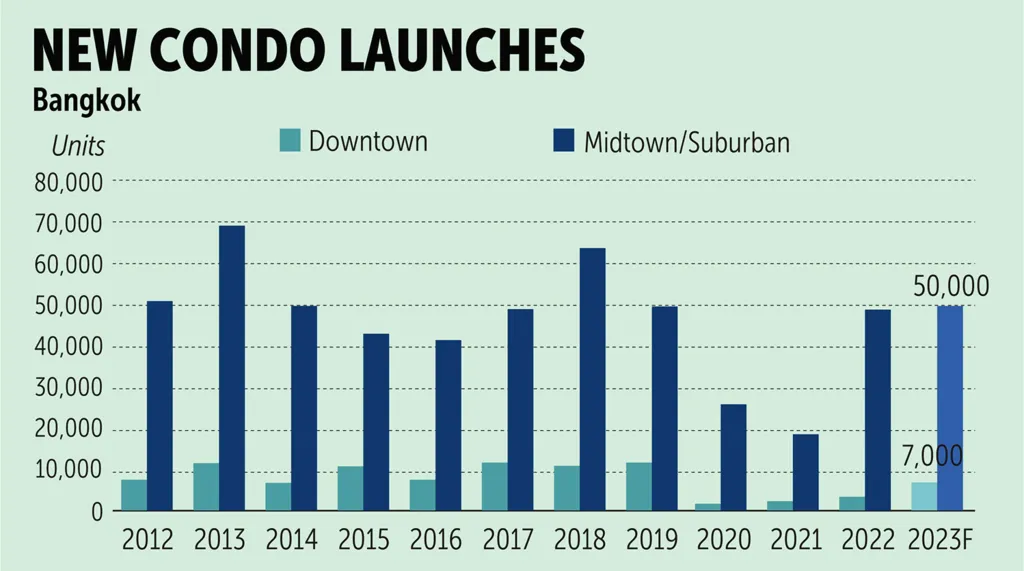Thailand’s real estate sector is undergoing significant changes. With a projected market value of $2.51 trillion by 2025, the industry is poised for growth. Key Thailand Real Estate Trends such as smart home technology, mixed-use developments, and sustainability are shaping the future of residential and commercial properties. These trends reflect changing consumer demands, economic shifts, and government initiatives aimed at boosting real estate investment.
Residential Market: Growth and Challenges in Thailand Real Estate Trends

Despite strong market potential, Thailand's condominium sector faced a 25% decline in sales in 2024. However, foreign investment, particularly from Russians, accounted for 7.8% of apartment purchases, stabilizing the market. Rental yields stood at 5.79% in 2024, with slight increases expected in 2025, making property investments appealing for landlords.
Buyers are increasingly seeking smart home features and automation, reflecting the growing demand for technological innovation in housing. Many new developments now include smart security systems, automated lighting, and energy-efficient appliances, making them more attractive to buyers looking for modern, convenient living spaces.
Sustainable housing solutions are also gaining traction, with green technologies and energy-efficient designs influencing buyer decisions. Developers are incorporating solar panels, rainwater harvesting systems, and environmentally friendly materials to attract eco-conscious buyers. This shift towards sustainability aligns with global trends and government initiatives promoting green building standards.
Read Also: Thailand Digital Construction Innovations Boost Growth
The Rise of Mixed-Use Developments
Mixed-use projects combining residential, retail, and commercial spaces are becoming more popular. These developments provide diversified income streams for investors and cater to changing consumer preferences. Urban centers, particularly Bangkok, are witnessing a rise in such projects, which offer convenience and lifestyle benefits in one integrated space.
For consumers, mixed-use developments provide everything they need in one location, reducing commuting time and offering better work-life balance. For investors, these projects offer multiple revenue streams, making them more resilient to economic fluctuations. Retailers and businesses benefit from built-in foot traffic, ensuring steady consumer engagement.
Economic and Foreign Investment Influence in Thailand Real Estate Trends
Thailand’s GDP is expected to grow between 3-4% annually through 2026. This economic recovery is fueled by increased tourism and exports, boosting consumer confidence and spending power. Government incentives and expanded foreign ownership rights have also led to rising international investment, particularly in key locations like Bangkok and Phuket.
Increased foreign interest is driven by the country’s affordability compared to other major Asian markets, as well as Thailand’s favorable property ownership laws for non-residents. Government programs offering long-term visas for investors and retirees have also encouraged foreign buyers to purchase real estate.
Infrastructure improvements, such as high-speed rail developments, are further enhancing property values. Regions outside major urban centers are seeing increased interest as improved connectivity makes them more accessible. The expansion of public transportation and modern road networks has led to rising property prices in emerging areas, providing new investment opportunities.
Read Also: The Successful Stories of Thailand Public-Private Partnerships
Future Thailand Real Estate Trends Outlook: Opportunities for Investors
The Thai real estate market presents both challenges and opportunities. The projected $2.51 trillion market value, strong rental yields, and government-backed incentives position Thailand as an attractive market for investors. However, developers must adapt to evolving buyer preferences, focusing on sustainability, technology, and mixed-use solutions.
The demand for luxury properties is also growing, particularly in tourist-heavy areas. With more high-net-worth individuals looking for second homes in Thailand, high-end condominiums and villas are seeing increased interest.
As Thailand’s economy recovers, the real estate sector will continue to grow. Investors who align with emerging Thailand Real Estate Trends will find promising opportunities in the evolving landscape. By focusing on innovation, sustainability, and strategic location choices, both local and international investors can take advantage of Thailand’s expanding real estate market.







